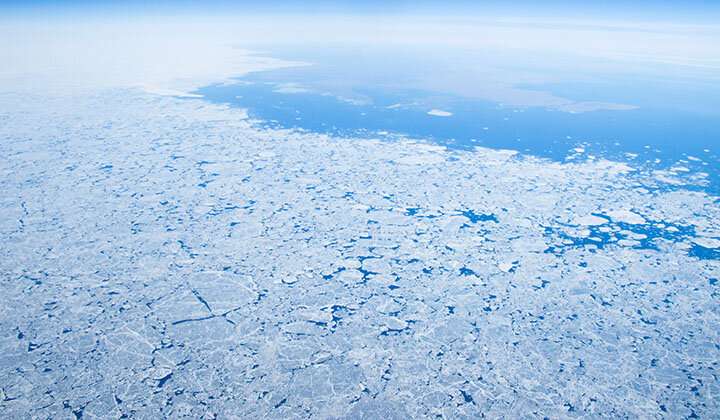International project aims to sequence the 'DNA' of the Arctic Ocean

The University of East Anglia (UEA) is leading a pioneering international project to sequence the DNA of marine microbes in the Arctic Ocean.
The resulting data will be used to develop models to predict how global warming impacts the diversity and activity of microbes—such as viruses, bacteria, microalgae and fungi—thereby altering ecosystem processes, including controlling the cycle of key nutrients, carbon capture and storage, and food chain dynamics.
Marine microbial ecology is a key component of the Arctic ecosystem. As the Arctic is undergoing drastic changes due to global warming, all ecosystems will be affected with unknown consequences for sensitive life forms.
Arctic marine microbes and their unique adaptations are far from being understood due to the logistical challenges of access, and sampling and experimentation under extreme polar conditions.
Supported by and drawing on the expertise of the Joint Genome Institute (JGI) in the United States, the project aims to address this by sampling sea ice and under-ice waters on a weekly basis for 12-months as part of a ground-breaking expedition. This involves the icebreaker RV Polarstern being frozen into the Arctic sea ice and drifting across the top of the Arctic Ocean over the next year.
The Multi-Disciplinary drifting Observatory for the study of Arctic Climate (MOSAiC) programme is taking the closest ever look at the Arctic as the epicentre of global warming to gain fundamental insights that are key to a better understanding of global climate change. Hundreds of scientists will conduct a range of marine, atmospheric, sea-ice related research.
Thomas Mock, professor of marine microbiology at UEA's School of Environmental Sciences, is leading the metagenome and metatranscriptome sequencing project, which will provide the largest number of sequences from a polar ecosystem. It involves researchers from five countries, including colleagues at the Alfred-Wegener Institute for Polar and Marine Research in Germany, who are part of the MOSAiC leadership team.
Prof Mock said: "The Arctic Ocean is one of the most underexplored environments on Earth. Consequently, our knowledge about the diversity of Arctic species, their basic biology, and adaptation and evolution is very limited, especially for microbes. To predict their response to future changes, we need to understand how their functionality is affected by environmental variability including global warming.
"This project will give us an unprecedented insight over a full year into the microbial communities in an area that has not been sampled to this extent before, providing a valuable data resource for a global community of researchers.
"It is opportunity to gain new insights into the functioning of the Arctic more broadly and to help us understand the overall ecological trajectory of this region. We also expect to discover many novel microbes that have developed an ability to thrive in this challenging environment."
Nigel Mouncey, JGI Director, said: "This project is another in JGI's portfolio of surveying underexplored environments to enrich the scientific community with new fundamental discoveries.
"The JGI and our user community have long recognized the utility of microbes to serve as the proverbial 'canaries in the coal mine' - barometers to provide early warning about changes in our environment.
"This project builds upon previous collaborations with Prof Mock's lab including the investigation into the evolutionary genomics of the cold-adapted diatom, Fragilariopsis cylindrus in the Antarctic. Projects like these represent enriching data resources for the worldwide research community."
The three main environments that will be sampled are sea ice, under-ice water, and melt ponds as they develop in the summer season. Over the 12-month period, the overall range of temperature is expected to be between -30°C to +5°C. Light conditions will be highly variable from total darkness in winter to 24 hours of light in summer.
Nutrient concentrations, climate-relevant gases, and organic substances can be highly variable in the Arctic Ocean, from undetectable to almost 100% saturation inside enclosed sea-ice pockets.
As a result, unlike many other ecosystems, the Arctic Ocean is characterised by significant environmental variability, potentially driving diverse and complex microbial communities.
Future calls for DOE Joint Genome Institute resources can be found at https://jgi.doe.gov/user-programs/
Provided by University of East Anglia



















